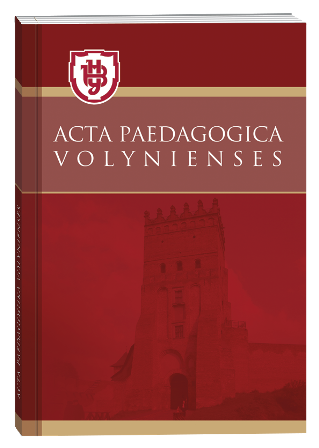ФОРМУВАННЯ ТВОРЧОЇ АКТИВНОСТІ УЧНІВ ПОЧАТКОВОЇ ШКОЛИ У РІЗНОМАНІТНІЙ МУЗИЧНІЙ ДІЯЛЬНОСТІ
DOI:
https://doi.org/10.32782/apv/2022.4.15Ключові слова:
урок музики, творчі здібності, види музичної діяльності, інформаційно-комунікаційні технології, музичне мистецтво, культура, загально мистецький, духовний розвиток особистості, засоби вихованняАнотація
В статті наголошується на тому, що методика формування музичного інтересу в молодших школярів під час занять музичним мистецтвом спрямована на вдосконалення змісту, форм і методів музичної освіти як сукупності компонентів формування потреби у творчої самореалізації, взаємозв’язок навчальних і дозвільних інтересів, свободу вибору при освоєнні музичних творів. Зазначається, що вивчаючи проблему інтересу, вчені, педагоги, музиканти приходять до єдиної думки, що це емоційно забарвлене ставлення до діяльності, прояв до цієї діяльності уваги, прагнення дізнатися більше. Доведено, що музичний інтерес – це бажання людини самостійно вивчити нове, вирішувати незрозумілі моменти. Музичний інтерес є основою творчого ставлення молодших школярів до музичної діяльності, яка в подальшому сприяє формуванню музичної культури особистості. Описано, що формування музичного інтересу вимагає від педагога враховувати особливості та закономірності вікової динаміки учнів. Для формування інтересу до музики у молодших школярів під час музичних занять педагогу необхідно використовувати музично-педагогічну, психологічну літературу, створювати та дотримуватися психологічні та педагогічні умови, застосовувати ефективні методи та прийоми формування інтересу молодого покоління до занять музичним мистецтвом. Доведено, що музичний інтерес молодшого школяра – це його свідоме позитивне ставлення до музики. Воно проявляється у пізнавальній активності, емоційно – вольової характеристиці відносин, практичному освоєнні музики як мистецтва. Інтерес до музики формується у процесі активної музичної діяльності. Наголошено, що у співі, слуханні музики, у грі на музичних інструментах учні знайомляться з творами, вчаться розуміти їх, набувають навичок та вмінь. Тому, що різноманітніша й активніша діяльність дітей на уроці, то успішніше може здійснюватися розвиток їх музичних творчих здібностей та формування інтересу до музики. Зазначається, що учням молодших класів хочеться отримати від музичних занять радість, але не кожен школяр погодиться досягати це ціною тривалої клопіткої роботи. Викладач має проявити максимум творчої винахідливості, щоб виробити в молодого покоління інтерес до занять, враховуючи їх вікові особливості.
Посилання
Грищенко Т. Зміст і організація форми музично-естетичного виховання в гімназіях України: Перша половина 19 ст. Рідна школа. 2001. № 11. C. 67–69.
Кемеровська О. Мистецтво у розкритті творчого потенціалу дитини. Обдарована особистість: пошук, розвиток, допомога. Київ : Генезис, 2008. С. 150–154.
Михайличенко О. В. Загальні методи музичного навчання. Теоретичні питання культури, освіти та виховання : pб. наук. пр. Вип. 27. Київ : Видав. центр КНЛУ, 2004. С. 49–53.
Печерська Е. Удосконалювати музично-творчий розвиток дітей. Початкова школа. 2000. № 6. C. 15–18
Рева В. Естетичне виховання школярів у процесі сприйняття музики. Мистецтво та освіта. 2009. № 1. C. 4–8.
Рева В. Індивідуальні стратегії формування естетичного сприймання музики школярами. Мистецтво та освіта. 2006. № 1. C. 12–15.
Рудницька О. Мистецтво у контексті розвитку духовної культури особистості. Художня освіта і проблеми виховання молоді : зб. наук, статей. Київ : Міносвіти України, УЗІМН, 2007. С. 3–11.
Сапожнік О. Музично-естетичне виховання: зміст і структурні компоненти. Рідна школа. 2002. № 12. C. 20–22.
Турчин Т. Естетичне виховання молодших школярів у позакласній роботі. Початкова школа. 2008. № 5. C. 16–17.
Чудак В. Музично-естетичне виховання молодших школярів. Початкове навчання та виховання. 2007. № 16–18. C. 15–20.







